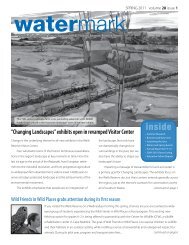Management Plan - National Estuarine Research Reserve System
Management Plan - National Estuarine Research Reserve System
Management Plan - National Estuarine Research Reserve System
You also want an ePaper? Increase the reach of your titles
YUMPU automatically turns print PDFs into web optimized ePapers that Google loves.
signs of wildlife, water quality monitoring, theProject Learning Tree Curriculum, and more.Teachers gain technological proficiency by usinglab facilities that include dissecting and compoundmicroscopes and water-quality testing equipment.In addition to teacher trainings and consultationsprovided as part of K–12 programs, the Wells<strong>Reserve</strong> offers occasional workshops for educatorsseeking continued education. Workshops areoften collaborations between the <strong>Reserve</strong> and itspartners.The Education Department provides lesson plansand suggests activities in response to specific inquiriesfrom teachers and other educators. The Wells<strong>Reserve</strong> also distributes the educator handbookWhat is Ecology? An Introduction to Ecologythrough Estuaries.Docent Naturalist TrainingThe Wells <strong>National</strong> <strong>Estuarine</strong> <strong>Research</strong> <strong>Reserve</strong> hasan active docent naturalist program through whichvolunteers are trained to lead programs for schoolgroups, community groups, and the general public.The docent corps is essential to programs such asExploring Estuaries, Water Quality MonitoringField Studies, WET, and Interpretive Walks.The Education Department ensures that docents arewell trained through special workshops. Docentsare required to complete extensive training (e.g.,24 hours of training for Exploring Estuaries) andshadow experienced docents before leading tourson their own. After a docent has completed thetraining and led tours on their own, they are askedto attend a minimum of four docent-training sessionsper year. Additional enrichment opportunitiesare available monthly through our Lunch ‘nLearn series, and other educational offerings fromthe Wells <strong>Reserve</strong> and its partners (such as EveningLectures and Public Programs).Public ProgramsA diverse mix of programs is offered to residents,tourists, and community groups throughout theFigure IX.6. A researcher explores estuarine sciencewith a student in the Junior <strong>Research</strong>ers program.year. These programs may be indoors or outdoors,general or specific, directed or interactive.Between May and September, the Wells <strong>Reserve</strong>Lecture Series offers monthly presentations byspecialists on a variety of topics (e.g., marine mammals,wildlife rehabilitation, seabirds, the underseaworld, insects of the marsh, and estuaries aroundthe nation). Each year, the <strong>Reserve</strong> offers a newslate of presenters and programs.The Lunch ‘n’ Learn series is an informal lunch timelecture program that occurs September throughMay. These lectures often highlight <strong>Reserve</strong>research, natural history topics of local relevance, orstaff and volunteer travels. Participants are encouragedto bring a brown bag lunch to eat while theylearn.Docent-led Interpretive Walks are offered onweekends in June and most days of the week in Julyand August. They address the history of Laudholm<strong>Management</strong> <strong>Plan</strong>: Education <strong>Plan</strong>73




